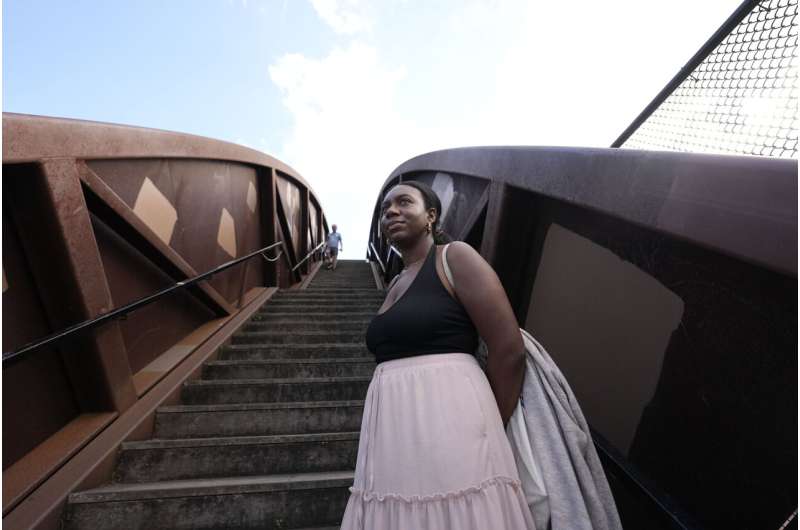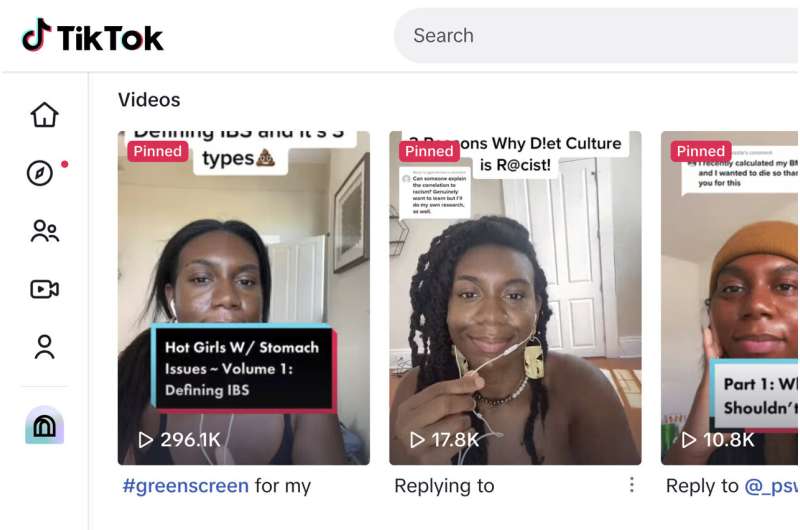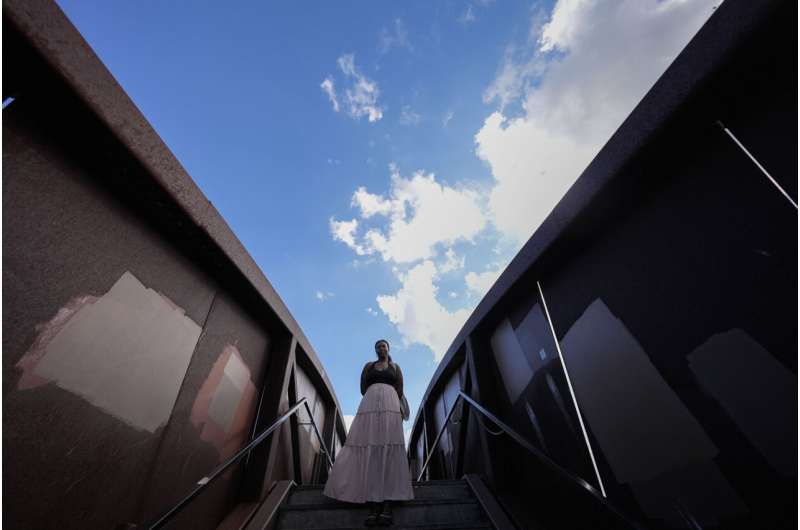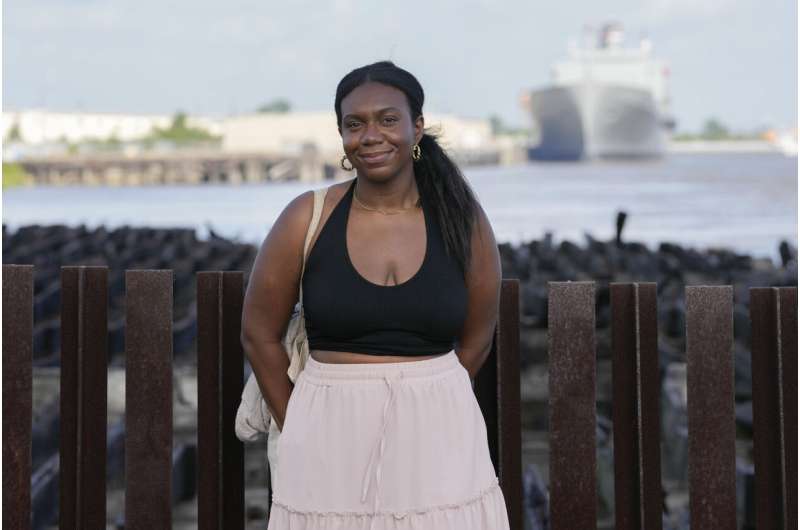
Lauren Bell stands for a portrait in Crescent Park in New Orleans, Wednesday, May 1, 2024. In December 2023, Bell posted a TikTok video in response to someone who asked if he could self-diagnose his IBS with this advice: “I would always recommend that you see a medical professional.” Credit: AP Photo/Gerald Herbert
Lauren Bell was stressed and just starting her first job after graduating from college in New York City when she realized that food poisoning wouldn’t go away after weeks.
During a doctor’s visit, she was diagnosed with irritable bowel syndrome, a surprising diagnosis. Until she learned more about the connection between mental health and gut health, and the prevalence of digestive problems in women.
“Working in a pretty intense environment, living in the city and being an adult for the first time took a toll on my body,” the 27-year-old said of her diagnosis five years ago.
Every few months, a new TikTok about digestive issues goes viral, a taboo topic often cited by women offering tips on how to reduce bloating or ease pain. Experts say it’s unclear whether this is an increase in people reporting digestive issues or whether the online conversation is leading to more appointments and diagnoses.
However, doctors are seeing a pattern of more and younger people seeking treatment for their gastrointestinal symptoms. They suspect that anxiety due to increased isolation during the pandemic is playing a major role in the increase in visits.
“I definitely have a lot of young women in my practice,” says Dr. Nina Gupta, a gastroenterologist in Chicago, “but in recent years I’ve also been seeing more younger men.”
Experts say connecting and sharing tips online can help, but they also want people to be careful. What looks like advice can become more like advertising when influencers are paid to convince people to buy a product.

This Thursday, August 1, 2024, the image shows some of Lauren Bell’s videos on the TikTok social media website. Bell, who occasionally takes over-the-counter medications to manage her symptoms, first started posting on Instagram about her struggles with IBS — how isolating it was and how she felt like she had to adjust her life and diet to accommodate her food sensitivities — and sharing her diagnosis with her friends Credit: AP Photo
How Your Brain Can Influence Your Gut
It’s not clear what causes irritable bowel syndrome. Food sensitivities and gut microbes may play a role, and research suggests that nervous system issues can stress the digestive process. Research suggests it can also be a two-way street: If your stomach is upset, it can affect your mental health.
And mental health, especially for Gen Z and younger millennials, is a major concern. While the pandemic has taken a toll on people of all ages, surveys showhave found These age groups reported higher stress and anxiety levels than other generations during and after the pandemic.
A 2023 report from the Centers for Disease Control and Prevention, which surveyed US high school students during the pandemic, found that the mental health of teenage girls had been severely affected, with nearly a third reporting that they had seriously considered suicide in the past year.
Anxiety among college-age adults, particularly young women, has “gotten through the roof” since the early 2010s, according to Jean Twenge, an expert on Gen Z mental health at San Diego State University. For high school students, experts say, the anxiety likely stems from two things: increased isolation during a formative period and a reliance on social media to feel connected.
While dietary changes can improve IBS symptoms, Gupta says a big part of treating her patients’ conditions is “recognizing that there’s a connection between their stress, their mental health, or their anxiety and their symptoms.”

Lauren Bell stands for a portrait in Crescent Park in New Orleans, Wednesday, May 1, 2024. Bell, who occasionally takes over-the-counter medications to manage her symptoms, first started posting on Instagram about her struggles with IBS — how isolating it was and how she felt like she had to adjust her life and diet to accommodate her food sensitivities — and sharing her diagnosis with her friends. Credit: AP Photo/Gerald Herbert
The scoop on poop
Nadya Okamoto hadn’t pooped in four days.
“I feel very bloated,” she said during a Zoom interview from her home in New York City.
Okamoto, who has more than 4 million followers on TikTok, has built her platform around publicly addressing sensitive topics. The 26-year-old is the founder of August, a menstrual product company, and frequently posts about her own menstrual cycle.
Some of her most popular posts over the past three years, however, have been about her experiences with irritable bowel syndrome, or IBS. Okamoto seems to share her experiences with everything from collecting stool samples for colon cancer, to constipation and bloating.
“It wasn’t until I started dating, having a close relationship and talking to my family about it that I realized it wasn’t normal to poop three times a month,” Okamoto told The Associated Press.
When she saw the hashtag “IBS” on TikTok, she went to the doctor and got a diagnosis. She tried three different medications to treat her IBS. None of them worked.
“From a young age, it’s not appropriate to talk about the potty, especially for girls,” she said. “We’re not encouraged to be open about it, which means we know less about our bodies.”

Lauren Bell stands for a portrait in Crescent Park in New Orleans, Wednesday, May 1, 2024. Bell fills a specific void on social media. “I felt like there weren’t a lot of people who looked like me and were making that kind of content,” she said. “It’s not just white women who are hot girls with IBS.” Credit: AP Photo/Gerald Herbert
Misinformation on social media
The downside of more people talking about gut health online is an increase in misinformation. Some of the most popular TikTok posts about IBS are from people claiming to have cured it or found a home remedy that has miraculously stopped some symptoms. Others recommend unproven supplements.
A quick look at these influencers’ accounts reveals a litany of sponsorships from probiotic or other health food companies. Gupta said viewers should be skeptical when people who aren’t professionals start giving medical advice.
Okamoto and Bell, who has a master’s degree in public health with a specialization in nutrition, talk mostly about their own experiences.
Both stressed that one of the best things about online conversation is that information becomes more accessible. That said, in December 2023, Bell posted a TikTok video in response to someone’s question about whether they could self-diagnose their IBS with this advice: “I would always recommend consulting a medical professional.”
‘Making people feel seen’
Bell, who is black, fills a specific void on social media.

Lauren Bell stands for a portrait in Crescent Park in New Orleans, Wednesday, May 1, 2024. Credit: AP Photo/Gerald Herbert
“I felt like there weren’t a lot of people who looked like me making that kind of content,” she said. “It’s not just white women who are hot girls with IBS.”
Bell, who occasionally takes over-the-counter medications to manage her symptoms, first started posting on Instagram about her struggle with IBS — how isolating it was and how she felt like she had to adapt her life and diet to accommodate her food allergies — and shared her diagnosis with her friends.
“It felt like it was a secret subject that everyone in my life was struggling with, and once you see it, you can’t unsee it,” she said.
Bell sees it as her role to help women of color have uncomfortable conversations about their gut health.
“Gut health encompasses gender, age, race and ethnicity,” she said. “We all poop.”
© 2024 The Associated Press. All rights reserved. This material may not be published, broadcast, rewritten or redistributed without permission.
Quote: Younger adults are coming clean about their digestive problems. Experts say it’s usually a good thing (2024, August 4) Retrieved August 5, 2024 from https://medicalxpress.com/news/2024-08-younger-adults-digestive-problems-experts.html
This document is subject to copyright. Except for fair dealing for private study or research, no part may be reproduced without written permission. The contents are supplied for information purposes only.
 Healthy Famz Healthy Family News essential tips for a healthy family. Explore practical advice to keep your family happy and healthy.
Healthy Famz Healthy Family News essential tips for a healthy family. Explore practical advice to keep your family happy and healthy.


